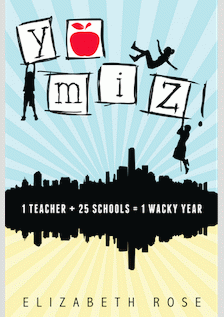Interview with Author of Yo Miz! 1 Teacher +25 Schools = 1 Wacky Year
My guest today is Elizabeth Rose, former high school teacher and author of Yo Miz! 1 Teacher +25 Schools = 1 Wacky Year. This is the second and final installment of our recent interview.
JB: Welcome back to OpEdNews, Elizabeth, for the second and final portion of our interview. You mixed it up during your year of subbing, also managing to put on a one-woman show. Can you tell our readers about that? How did it go?
ER: The show went great, thanks for asking. For six years, I'd been developing Relative Pitch, a one-woman musical comedy about the life of a performing songwriter, based on my own experience. The Cherry Lane Theatre chose to produce it in its venerable Mentor Project, for a two-week, 12-show run in Feb/March 2012. This was the opportunity of a lifetime for me and a HUGE honor. I wrote the book, all 19 songs, performed all the roles and, with my five guitars on stage, was the band. I also recorded the "original cast album."
When I got the news that we were going into production, I realized that the first week of performances would fall on a week in which public schools were closed. That was extremely lucky. However, for my second week of performances, schools were open again. Assigned to a new school, I would be expected to teach full time all week.. I knew I couldn't teach all day and give a great performance every night. I applied to the NYC DOE for a week off without pay. They promptly refused. My choices? Teach all day and perform a 70-minute one woman musical comedy at night? Impossible. Pretend to be sick? Not my style. You have to read Yo Miz! to find out how I managed to get through it. Let's just say, I drew on the wisdom of George Costanza, the Oracle of Seinfeld who said, "It's not a lie if you believe it."
JB: Have you kept in touch with any of the other ATRs? Did the DOE accomplish what they were hoping for: to make a year of new weekly subbing assignments so unbearable that most of them would rather quit?
ER: Yes, I have one friend who stayed in the ATR "pool" for three years, then retired. Although I don't have any other close friends in the ATR pool, I have daily contact with many of them online. Let's just say that this wacky rotation still continues for estimates of 1500 teachers or so. I don't believe these numbers are made public. From my observations, there are talented, professional, experienced, innovative teachers from all subject areas, school guidance counselors, school social workers and even administrators who are still ATRs, assigned to a new school each week. It hurts my heart to read their stories. Many of them have years of teaching experience so they have pretty decent salaries. This makes it difficult for many of them to get appointed into permanent positions. A principal can hire two new teachers, fresh out of grad school, for the cost of hiring one ATR. (BTW, with a 40% attrition rate within the first five years of teaching, chances are these new teachers may leave.) When you do the math, you can see why ATRs, many of whom are raising families, get "stuck" in this rotation. So, in answer to your question, I wouldn't imagine the DOE is celebrating its success in getting ATRs to leave. They haven't offered me a champagne toast...yet.
JB: Knowing what you know now, if you had high school-age kids, what would you do with them?
ER: If I had high school-age kids in NYC, I would do everything I could to get them accepted into one of the top public high schools that "screen" students. These are schools like Baruch, Millennium, Bronx Science and Stuyvesant. There are more. This would require investment on my part: into tutoring, standardized test prep, after school arts and sports programs.
I'd be able to do this because I already had a privileged upbringing and excellent NYC public school education. But what about the kids who are bright, creative and don't have the head start I've had nor the funds for the outside enrichment and test prep? You've heard of segregation by zip code? Jus' sayin'.
JB: I hear you. And if, even with extra prep, you were unable to get those hypothetical kids into one of the "screening" school? Then, what would you do? Let's take this to its logical conclusion.
ER: I think I see what you're going for and, there's a little shame I feel in my answer: I would probably not put them in an "average" NYC public high school.
(Note: You can view every article as one long page if you sign up as an Advocate Member, or higher).







